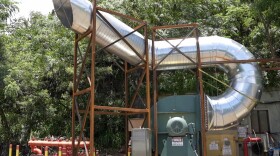The Navy finally released its report on a handful of homes that were reporting fuel contamination in their drinking water, specifically TPH, total petroleum hydrocarbons. The report looked at the premise plumbing, which includes piping and water heaters.
Two military wives say they don't trust the findings, adding that if the 271-page report was supposed to make them feel better, it did not.
Melissa Cook is one of the military families whose home was tested. She lives at Hickam Officer Field. The water system in her home tested positive for total petroleum hydrocarbons twice last year.
"Our house was tested back in October and we had a TPH of 50.2, and then again in December when they came out to do our water heater, tested positive and it was more — 64.3. And then they came out again in February, and this last result just came out and it said non-detect," Cook said.
"My concern is that we've tested positive, and then it went higher. And there are times when we can tell that there's something in the water, and they don't have any answers for us. And their only answers are, 'It's safe.' And they don't have proof that it's safe."
Cook also said there are discrepancies in the Navy report. She said that the Navy claims no aerators or water fixtures were replaced while addressing the water contamination, but the Navy replaced multiple parts in her home.
"This isn't bringing a peace of mind that it's supposed to be bringing to the people. It's just another par for the course I guess," Cook said.
Lacey Quintero is a member of an EPA Community Representation Initiative that meets regularly with the military on water issues. Quintero has been critical of the military's response to the drinking water contamination.
Her family was among the thousands who suffered health problems after drinking fuel-contaminated water in 2021.
"One of my big concerns here is they've launched all of these efforts to find the cause. It's been an enormous amount of time, money and effort, but when they find a cause, they dispute their own findings, and they go back to claiming lab error, and then they kick the can down the road and call for further investigation," Quintero said.
"I don't feel they're actually trying to find the cause. They use tricky wording, you know, claiming they can't tell if it's algae or fuel, but fuel smells like fuel, you know, there's not algae coming out of the shower."
The military is in the process of shutting down the Red Hill fuel storage facility. Joint Task Force-Red Hill finished gravity-draining 104 million gallons of fuel from the facility in December.
This story aired on The Conversation on March 14, 2024. The Conversation airs weekdays at 11 a.m. on HPR-1. Sophia McCullough adapted this story for the web.






